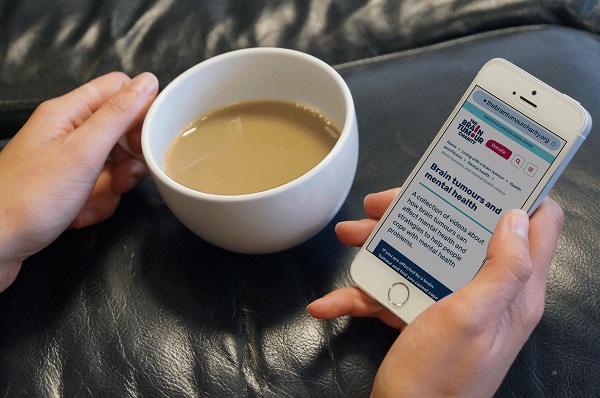Knowing what to say (and what not to say) when your loved one has been diagnosed with a brain tumour can feel incredibly worrying – trying to make sure they know you’re there for them, but not wanting to say the wrong thing, or ‘put your foot in it’.
So, to help you find the right words, we’ve created a helpful Do’s and Don’ts list, to guide you when you’re stuck for words.
Don’t say:
“Don’t worry, I’m sure you’ll be fine!”
Often we say things like this because we don’t know what else to say, we don’t fully understand, or we’re scared, but it can feel too reductive. Instead why not say, “This sounds incredibly hard for you, let me know how I can help.”
Instead, Do:
Be a shoulder to cry on.
Let people talk, cry, vent and give them time to do so. Just listening, and acknowledging how they feel, can often be enough, because, sometimes, just knowing someone’s there is all they need.

Join our community on Facebook
Our closed Facebook group is a safe and secure space to connect with other carers and share your experiences.
Don’t say:
“You don’t look like you’ve got cancer?”
Sometimes we may say this meaning it as a compliment, but often it doesn’t feel this way. Symptoms like fatigue, or impact on memory, communication or emotion can all be difficult side-effects of a brain tumour. Remember, just because you can’t see them, doesn’t mean they’re not there.
Instead, do:
Ask how you can help and how they’re doing.
Talk to your loved one and make sure you really understand how they feel and what support would be best for them. We can get carried away thinking of ways to help, but it’s best to just ask what they need.
Don’t say:
“You’re such an inspiration! You’re so brave!”
Some people we’ve spoken to have found this type of comment frustrating and impersonal, explaining they haven’t asked for this and it was not a challenge they wanted to face. Talk to your loved one and ask if this would frustrate them, if so talk about how else you can explain your respect for them.
Instead, do say:
“I wasn’t sure what to say but I just wanted to let you know I care/I’m here for you”.
It can be daunting to hear a loved one’s been diagnosed with a brain tumour, and it’s completely normal to struggle with what to say to them. But honesty is the best policy, and if you’re worried and don’t know what to say, let them know. Saying something’s better than saying nothing.
Don’t say:
“I bet you’re glad treatment’s over.”
It’s easy to assume that just because someone has finished their treatment they’ll be happy about it. The truth is, finishing treatment can be a really scary time and the long-term effects of cancer can be just as hard.
Instead, do:
Carry on being supportive beyond the treatment phase.
Treatment for a brain tumour can have a big impact on someone’s life even for a while after. It’s important to keep checking how someone’s feeling even after treatment’s finished, as they might still be struggling.
Don’t say:
“I know someone who had that” or “I know just how you feel.”
Everyone can experience a brain tumour diagnosis, treatment or side-effects differently. It can be easy to try to relate to the individual’s experience, but often it’s better not to compare and simply listen to their personal experience.
Instead, say:
“Whatever you decide I’ll be here to support you. If you want to talk about it, you can just let me know.”
There are a lot of decisions to make following a diagnosis and it can be easy to read about new or developing treatments. But, ultimately it is up to your loved one to make decisions about their treatment and it is important to support them with these.
Don’t:
Try to fill every second with conversation.
Instead, do:
Let them talk when they’re ready
And remember to give them space to speak, instead of interrupting with what you think will be comforting.

Free counselling
If you need to talk, we’re here for you. We offer free sessions to help you cope.
